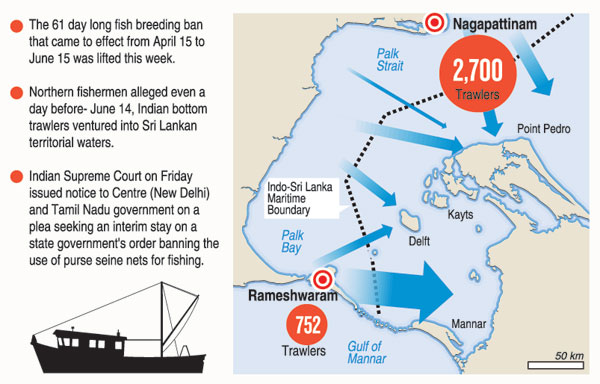News
Ban ends, hundreds of mechanised Indian fishing trawlers in Lankan waters again
View(s):Lankan fisher folk in kerosene queues, some families face starvation
As a two month breeding ban that was imposed on Tamil Nadu mechanised bottom trawlers came to an end on Wednesday, Indian fishermen have started returning to the northern waters of Sri Lanka.
Northern fishermen who are struggling to secure adequate kerosene to go fishing these days due to the ongoing fuel shortage, called for the intervention of the Tamil Nadu Chief Minister to resolve the conflict between the two fisher folk communities across the Palk Strait.
The ban was lifted on Wednesday and two days later hundreds of Indian mechanised bottom trawlers entered Sri Lankan territorial waters near Delft island and engaged in fishing, while local fishermen were struggling to find kerosene to go fishing. About 540 mechanised trawlers left from Rameshwaram fisheries jetty yesterday.
“The economic crisis made things far worse for our community since daily wage earners are struggling to put food on the table. Others are merely managing with savings and pawning their jewellery. How long we can survive like this?” asked Annalingam Annarasa, President of the Jaffna District Fishermen’s Federation.
Northern fishemen who organised a protest march this week handed over their letters addressed to the Indian External Affairs Minister S. Jaishankar and TN Chief Minister M. K. Stalin at the Indian Consulate General’s office in Jaffna on Thursday.
“It is unfortunate that the Indian fisherfolk are taking advantage of the economic crisis in our country, by openly engaging in fishing in our waters while our folk are in queues to secure kerosene. They should understand our plight and try not to aggravate this issue,” Mr Annarasa said.
At present, Lankan fisherfolk are given only 20 litres of kerosene for every three weeks under a ration system through grassroots level fishermen federations. However, fisher folk complained that the amount of fuel provided was not enough to engage in fishing.
As a result fish prices had also increased sharply in recent weeks due to a limited catch and increasing demand in local markets.
Mr Annarasa said apart from fisher folk, many war affected families and fisher workers who depend on fishing were struggling to survive due to the fuel crisis.

Meanwhile, India’s Supreme Court on Friday issued a notice to the Central government and the Tamil Nadu state government on a plea seeking an interim stay on a state government’s order banning the use of purse seine nets for fishing.
The law had been passed by the Tamil Nadu government without considering the views of an experts committee and the fisher folk and as a result of this, some 1.5 million people had lost their jobs. Many fisher folk were a weak community and their family members were starving. All export units had been closed by the TN government in an arbitrary manner, the plea stated.
“Drawing attention to the 61 day long ban, the plea added that the two month ban on mechanised fishing will help the breeding of fish schools and help them recover from mechanised fishing since the ban is to facilitate fish breeding. All the mechanised boats from Palaverkadu to Kanyakumari will be moored during the ban period. The impugned order passed by the TN government is unconstitutional,” the plea said.
In January, the Chennai High Court held that there was no illegality or unconstitutionality in banning the use of purse seine nets for fishing in Tamil Nadu.
The best way to say that you found the home of your dreams is by finding it on Hitad.lk. We have listings for apartments for sale or rent in Sri Lanka, no matter what locale you're looking for! Whether you live in Colombo, Galle, Kandy, Matara, Jaffna and more - we've got them all!

